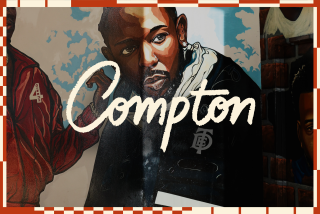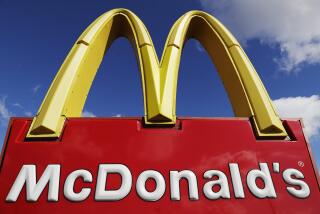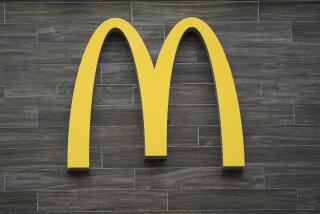Big Mac Shakes Up a Small Town
- Share via
COUDERSPORT, Pa. — The day it opened, it seemed all Potter County streamed in. Children jostled for Happy Meals. The judge visited the drive-thru (Quarter Pounder, apple pie and Diet Coke, scuttlebutt had it). Downtown merchants sent flowers.
“Now,” said 15-year-old Matt Seeley, “we don’t have to drive 40 miles for a Big Mac anymore.”
On that day last September, two American institutions--one the stuff of tradition, the other the stuff of all-beef patties and sesame-seed buns--converged. On that day, McDonald’s met Main Street.
There are fewer and fewer towns in the land where “Would you like fries with that?” is not a familiar refrain. Until McDonald’s No. 20,160 arrived with its 57 seats, three outdoor tables and golden-arch architecture scaled down to minimum obtrusiveness, this Allegheny River Valley town of 3,200 souls was one of them.
Coudersport is the sort of unblemished town that late-20th century Americans dream about--full of mom-and-pop businesses, public spaces and first-name greetings. Until last year, there were two diners, an old-time hotel-restaurant, a couple of pizza places and three family restaurants, but no national fast-food chains for miles around.
Many citizens were ready for the McDonald’s that opened on the edge of their downtown. It meant a spot on the map. It meant that they were plugged into the modern American goulash of advertising, commerce and popular culture.
It also meant apprehension--about what might come next.
*
“Some of the merchants here are deathly afraid of this McDonald’s,” Jeff Kazimer was saying a few months before the Golden Arches arrived.
Kazimer (one of Coudersport’s two barbers) and five companions were eating lunch in the Crittenden Hotel, considered the borough’s classiest restaurant. But conversation veered to the town’s new eatery.
“Teenagers--all they do is walk the streets here. This’ll give them some self-esteem,” said Shirlee Leete, a writer and state police photographer. “This will give jobs to a lot of people who haven’t been hired in a lot of places.”
“It’s a sign that we’re making progress,” said Mavis Macklem, who runs Coudersport Insurance.
Even Walter Baker, the president of Coudersport’s Chamber of Commerce and owner of the Crittenden, concurred. “It’ll bring more people into town,” he said. “That can only be good.”
When McDonald’s came calling, concerns surfaced: Would gaudy signs and car-culture architecture push Coudersport toward garishness? Would traffic be unbearable? Would kids loiter and make trouble, straining the borough’s four police officers?
More ominously, would Burger King, Pizza Hut, even Wal-Mart follow, taking business from downtown? Would Coudersport lose its uniqueness?
“When the first franchise comes to town, it’s generally a wake-up call for the community. People begin to ask: ‘What do we want?’ ” says Kennedy Smith, director of the National Main Street Center, part of the National Trust for Historic Preservation.
“This is exactly the time to look at it,” she says. “In 10 years, when there’s the Pizza Hut and the strip mall out there, it’s simply too late.”
*
Pennsylvania has the nation’s largest rural population; in 1990, 31.1% of its 11.8 million people lived in rural areas, according to the U.S. Census. Research by the Center for Rural Pennsylvania tells a familiar story--small-town retailers fleeing to the strip malls, older downtowns struggling, new development in outlying areas.
Many Main Streets have withered or tapered off into netherworlds of chain motels, chain restaurants, chain muffler shops, chain mini-marts.
“You can airdrop yourself into some places in the United States and not know where you are,” says Carol Truppi, director of programs for Scenic America, a preservation group.
That may not be desirable, but it is understandable. An estimated 95% of Americans have eaten at McDonald’s, and marketers work hard to make standardized fast food an integral part of the adscape.
“Consumerism is the future. It’s how we’re going to be tied to each other,” says Bill Caldwell, just retired as Potter County’s jobs officer.
*
Since 1978, Gene Walsh, whose GIW Enterprises is the McDonald’s franchisee in this chunk of Pennsylvania, has dedicated his career to making a national corporation work on a local level. To Walsh, McDonald’s is a family business.
His son, Bob, runs the McDonald’s in Towanda, 70 miles east; his daughter, Debbie, runs the one in Mansfield, 30 miles away. GIW also operates the McDonald’s in Wellsboro, another nearby Route 6 town.
“It’s just an amazing company,” says Walsh, a former driver for UPS. “There’s always somebody who wants to bad-mouth it, but it’s like a family.”
McDonald’s has long encouraged this approach. Eighty-five percent of its U.S. stores are franchises, granted to business people who in many cases live in the communities where they operate.
“Some people saw us as displacing the local mom-and-pop,” says Chuck Ebeling, a spokesman for McDonald’s Corp. “I think the transformation in 40 years is that we are mom-and-pop now. We’re not an unknown entity coming to town.”
*
On a cold February morning, months after McDonald’s arrival, Jack Halloran arrives at his hardware store with a steaming cup of coffee. Underneath the Crittenden, Jeff Kazimer is bibbing up the day’s first trim.
At Mickey’s Diner, Shirlee Leete takes a seat and lights the first in a succession of Misty Menthols. Behind her, the police chief sips coffee. An acquaintance returns a dime borrowed for parking.
The tables are full, and Leete knows each occupant. The omelets, jammed with fresh stuff, spill over plates and are never the same shape. “Curb your tongue,” warns a sign, “or you might be tonguing the curb.”
Finally, there is 78-year-old Mickey Goodwin herself, who for three decades has risen at 4 a.m., made doughnuts and taken no guff--and who has never set foot in McDonald’s.
“Regulars are very loyal,” says her daughter, Nancy Giannone. “McDonald’s is affecting everyone a little bit, but they’ll always come in for Mom’s fry cakes and glazed Danish.”
Meanwhile, at McDonald’s, people queue up for Egg McMuffins, where the eggs fit the McMuffins perfectly and there is no ordering “the usual.”
“At McDonald’s,” laments Halloran, “the cook doesn’t come out and talk to you.”
McDonald’s will always be clean, quick, and--with a few regional variations--the same. Main Street may not be so unchanging; the arrival of the fast-food behemoth could signal the start of a civic deathwatch.
Then again, maybe not.
“You see a lot of towns die. Somehow, Coudersport hangs on,” says Caldwell, the retired jobs officer. “Diversity has been the lifeblood of the town. If something fell through, there was something else to fall back on. And I think this is an evolution--something a little more diverse that might help us hang on a little bit longer.”
More to Read
Sign up for The Wild
We’ll help you find the best places to hike, bike and run, as well as the perfect silent spots for meditation and yoga.
You may occasionally receive promotional content from the Los Angeles Times.






